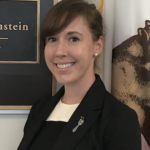While growing up in California’s capital city, Sacramento, Christina Downey, MD, learned early on that it’s important to speak up for what’s important to her. When she completed her fellowship and joined the ACR in 2015, she found her way to the ACR’s Advocacy 101 program, which trains rheumatologists to become advocates in Washington, D.C., as part of the ACR’s Advocates for Arthritis fly-in event each September.
“It’s been important to me to make advocacy a part of my rheumatology practice, because speaking directly to legislators about how policy decisions impact rheumatologic care truly makes a difference for our patients,” says Dr. Downey, an assistant professor of medicine with the Department of Rheumatology at Loma Linda University Health in Loma Linda, Calif.
Three years after becoming a member of the ACR, Dr. Downey now serves on the College’s Government Affairs Committee (GAC), which works to ensure rheumatologists and rheumatology health professionals have a voice on Capitol Hill, with federal agencies, and in state legislatures, and helps other ACR/ARHP members realize the power of advocacy in improving patient care.
She notes two of the many wins GAC celebrated recently: 1) the cancellation of the Medicare Part B Demonstration Project and 2) participation in a coalition to address pharmacy benefit manager concerns, such as better transparency.
“This year, we continue to lend a reasoned voice on Capitol Hill to make sure the focus of healthcare remains on the patient,” Dr. Downey shares. “As changes continue in the healthcare policy arena, I’m excited to see our influence with helping the country redefine healthcare delivery and cost containment overall.”
Inspiring Advocacy
Dr. Downey believes the key to ensuring a strong voice in Washington, D.C., is connecting with fellows and early career rheumatologists to get involved early on. “Through Advocacy 101 and the work of GAC, we can inspire the habit of advocacy to advance our profession and educate our legislators.”
Leading up to this year, Dr. Downey has worked as a participant, then a junior assistant, and is now one of the leaders in planning and conducting the ACR’s Advocacy 101 program started by ACR members Blair Solow, MD and Sarah Doaty, MD. The program involves a day of training on how policymaking works and how to talk to legislators and educate them on the rheumatology physician perspective. Participants then take their training to the Capitol to meet with legislators, share stories from their practice and encourage policy decisions that support patient care.

